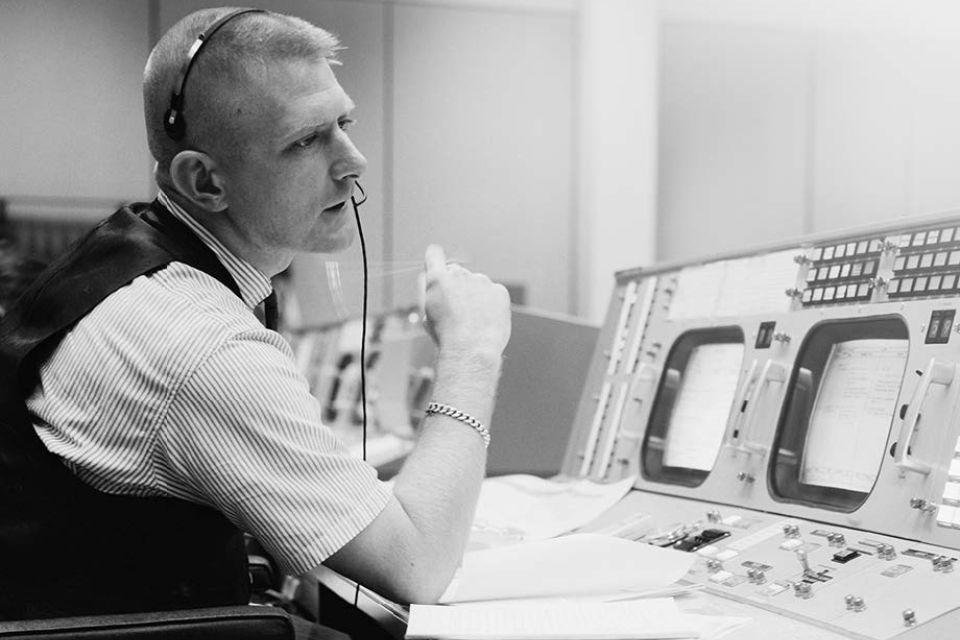Reach Far and Never Surrender
In McDonnell Douglas Hall, a portrait of Eugene Kranz hangs as a reminder that greatness starts at Saint Louis University. More than a name on a wall, Kranz is a pioneer who reshaped the very fabric of space exploration. His journey set a new standard for students at the School of Science and Engineering, inspiring them to push the boundaries of what is known and leave an indelible mark on the world.
Up and Away
Kranz knew one day he would take to the skies, yet he needed foundational knowledge to do so. He chose to pursue his dream by enrolling in Parks College of Engineering, Aviation and Technology at Saint Louis University in 1951. Parks offered a comprehensive education paired with first-hand experiences, including welding, deconstructing and repairing engines. Kranz credits this as the starting point of his successful career in aviation and aerospace.
“From the standpoint of jobs I did — a pilot, engineer and flight director — my success hinged on the knowledge of what it takes to make things work,” Kranz said.
In the process of building his technical expertise, Jesuit principals molded Kranz’s leadership approach. One transformative course allowed him to delve into logic under the guidance of a Jesuit professor. There, he uncovered the intricacies of reasoning and the value of new perspectives — lessons that would later prove indispensable in the most critical environment: Mission Control at NASA.
“We learned to debate, assess and come to better decisions,” Kranz said. “We opened our vistas to accept a new path from other people.”
After graduating from SLU in 1954 with a B.S. in Aeronautical Engineering, his dream came to fruition. Kranz began working as a pilot in the U.S. Air Force and later as a flight test engineer at McDonnell Aircraft Corporation. However, his innate curiosity soon charted an unexpected course. An advertisement requesting engineers to explore putting man into space pushed his aspirations toward the stars.
Into the Unknown
In 1960, Kranz entered the NASA Space Task Group in Langley, Virginia, as an assistant flight director for Project Mercury. He carved a place for himself in Mission Control, uncovering his deep appreciation for its high-stakes environment.
"When you're working five miles a second, you don't have time to do a lot of discussion,” Kranz said. “You have to adjust your frame of mind. You need higher levels of preparation.”
Kranz's ascent was remarkable. He started as a valued team member and transformed into a mission-critical leader — eventually earning his first lead role as flight director for Project Gemini. His even composure and adaptive problem-solving further cemented his reputation at NASA, giving rise to another promotion to division chief for flight control. Kranz reached the pinnacle of his career as flight director for the Apollo Program, where he steered groundbreaking moments in space exploration. With his guidance, the Apollo 11 crew took its first steps on the moon and demonstrated the limitless possibilities of human achievement.
“It has been my utmost pleasure to not only attend, but be associated with Saint Louis University. I hope this professorship will motivate people to go faster, reach far and never surrender.”
Eugene Kranz
Moreover, his leadership during the infamous Apollo 13 rescue mission revealed his true prowess under pressure. The spacecraft experienced an oxygen tank explosion en route to the moon, prompting quick and decisive action from Kranz and his "Tiger Team" to secure the crew's safe return.
“They had confidence I was going to do the right thing,” Kranz said. “[The phrase] ‘failure is not an option’ truly encapsulated my mindset in dealing with a very high-risk environment.”
In Honor of Excellence
Kranz’s legacy has earned him portrayals in Hollywood films, honors from countless aeronautics organizations and multiple best-selling books. To this day, recognitions for his contributions steadily roll in. In 2024, he was elected to the National Academy of Engineering by his peers, who noted his lifetime dedication to aeronautics and commitment to advancing the human condition through engineering.
“I’m [always] surprised to receive these benefits,” Kranz said. “Through them, I hope to influence another generation of people to achieve the best.”
Kranz's legacy transcends his monumental achievements in space exploration, continuing to ignite inspiration in research and education. Notably, a recent tribute at Saint Louis University's School of Science and Engineering reflects his enduring impact.
In honor of Kranz's influence, Dean Gregory E. Triplett, Ph.D., introduced the Gene Kranz Professorship of Research/Teaching Excellence. This prestigious professorship is not just a nod to Kranz's storied career but a beacon to light the path for future innovators and explorers.
“It has been my utmost pleasure to not only attend, but be associated with Saint Louis University,” Kranz said. “I hope this professorship will motivate people to go faster, reach far and never surrender.”
